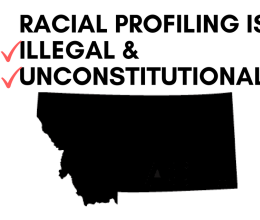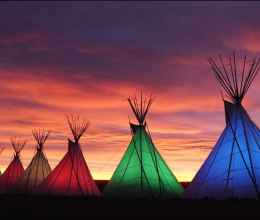
I was traveling along HWY 12 to Helena from Missoula. My coworker was driving our rental vehicle, and we were headed there for meetings. About five miles outside of Avon, a Montana Highway Patrol car driving in the opposite direction made a swift U-turn in the middle of the highway after passing us. The patrol car’s lights flashed. We knew we were about to be stopped.
My coworker and I communicate regularly with individuals from immigrant communities, as well as non-white US citizens. One, true thread that weaves through all of these conversations is that people are living in fear. Recent raids by ICE across Montana have made normal activities - like going to work, or even just leaving the house – a nerve-racking prospect. Increased racial profiling and police harassment is significantly impacting the quality of life for people of color, regardless of citizen status or ethnicity.
The ACLU of Montana has confirmed that the Montana Highway Patrol is collaborating with ICE to locate and arrest undocumented immigrants, using racial profiling as one of their primary tools. Racial profiling targets all people of color, regardless of immigration or citizenship status, simply based on the color of their skin or for speaking a language other than English. This includes people like Ana Suda, who was interrogated by a Border Patrol officer for speaking Spanish with her friend in a gas station. It also includes stopping vehicles that contain people of color and demanding that all individuals within the vehicle produce some form of legal identification, regardless of whether the officer has grounds for such a request.
I am a gender non-binary person of color living in Montana. I am also a U.S. citizen. One of my parents, a queer person of color, immigrated from Colombia in the 1970s. From an early age, the validity of my calling this country my home has been questioned. My quality of character and the intentions of my actions were questioned. The implication that my family is a set of criminals was implied by peers, employers, and through officer harassment. I heard consistently from my white friends and family that these “small” instances of racial profiling are “no big deal” or imagined. My white friends, family, and former coworkers willfully choose to turn their eyes from the seemingly minor incidents that lead to a growing atmosphere of fear and hostility within our communities.
As my coworker pulled our rental vehicle onto the shoulder of Highway 12 that day, we both felt tense. She, an Indigenous woman, rolled down the window and placed her hands on the steering wheel, staring straight ahead. She waited until the officer could see inside the vehicle to reach for her wallet. I didn’t move until the officer asked for registration, then opened the glove box to retrieve it. During these two actions, the officer didn’t comment on our movements. We have been conditioned to move this cautiously around law enforcement.
Then, the officer turned to me and asked me to produce an ID. I knew the officer had no legal right to ask me, as the passenger, for identification. I paused, unsure of what to say. My coworker replied, “Why do you need to see their ID?” With my non-binary pronouns spoken aloud, my heart beat skyrocketed. If the color of my skin was enough for the officer to demand identification, what would the announcement of my queer identity lead to? I hoped the officer hadn’t noticed. The officer replied that asking for all passengers’ IDs was something that she always did during traffic stops. My coworker and I looked at each other. Neither of us wanted to push back, even though we knew this was improbable and definitely illegal. We were afraid of what the officer would do if we refused to comply.
I didn’t remember where my ID was in the vehicle. I wondered how the officer would react if I couldn’t provide identification. As calmly as possible, I told the officer I needed to look for my ID in the backseat, where my coat and backpack were. The officer immediately asked if I had any weapons in the vehicle. My coworker and I replied, “No.” I wondered how much time I would have to look for my ID before she became suspicious of me again. Fortunately, I quickly located my wallet and pulled my driver’s license out. The officer took it, wrote down information from my ID on her notepad, then took both our IDs back to the patrol car. While the officer was back at her car, I asked my coworker to stop using my correct pronouns. “Please misgender me,” I stated, ashamed and scared. Thinking about it now still makes me angry.
I am an ACLU of Montana employee. I know full well my rights in this situation, but I was still scared. For myself and for my coworker. This officer abused her power and harassed two people of color. If we were scared, I want you to imagine how other people of color, who may not know their legal rights or who may speak with an accent that an officer deems to be “un-American,” would feel in a similar situation - to be stopped and questioned, only because of the color of one’s skin.
The only irony in this situation exists in the officer choosing two ACLU employees and civil rights activists to demonstrate her unabashed audacity to lie to our faces about the extent of her power. But the implications are much more serious. As a community, we need to hold our officers accountable. Montana Highway Patrol and other law enforcement agencies cannot use racial profiling as justification for harassing or detaining individuals. We cannot allow for racial profiling, no matter how small or insignificant it may seem in others’ minds. Because eventually, if we keep silent about this, those who seek to abuse their power and authority will see it as permission.




